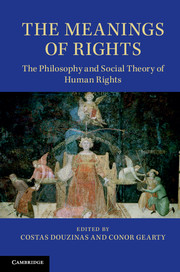Book contents
- Frontmatter
- Contents
- Notes on contributors
- Introduction
- Part I Finding foundations
- 1 On human rights: two simple remarks
- 2 Human rights: the necessary quest for foundations
- 3 Against human rights: liberty in the western tradition
- 4 Religious faith and human rights
- Part II Law, rights and revolution
- Part III Rights, justice, politics
- Part IV Rights and power
- Index
- References
4 - Religious faith and human rights
Published online by Cambridge University Press: 05 June 2014
- Frontmatter
- Contents
- Notes on contributors
- Introduction
- Part I Finding foundations
- 1 On human rights: two simple remarks
- 2 Human rights: the necessary quest for foundations
- 3 Against human rights: liberty in the western tradition
- 4 Religious faith and human rights
- Part II Law, rights and revolution
- Part III Rights, justice, politics
- Part IV Rights and power
- Index
- References
Summary
Twenty-seven years ago, Alasdair MacIntyre in his seminal work on the foundations of moral discourse, After Virtue, declared that human rights did not exist. ‘Rights which are alleged to belong to human beings as such and which are cited as a reason for holding that people ought not to be interfered with in their pursuit of life, liberty and happiness’ are a fiction: ‘there are’, he says, ‘no such rights, and belief in them is one with belief in witches and in unicorns’. The language of rights emerges, MacIntyre argues, at a time when people need a fresh moral compass in the wake of the dissolution of much traditional morality; like the concept of ‘utility’, which is another characteristic notion developed in the modern period as a touchstone for moral decision, the idea of ‘rights’ is meant to act as a trump in moral argument. The trouble is, MacIntyre argues, that rights and utility do not get along very well together in argument: one is essentially about the claims of the individual, the other about the priorities of administration. The result is the familiar modern standoff between the individual and the bureaucratic state. The state is both the guarantor of rights – more clearly than ever with the emergence of the ‘market state’ in which the most important reason for recognising the legitimacy of a state is its ability to maximise your choices, as Philip Bobbitt has demonstrated – and the authority that claims the right to assess and on occasion overrule individual liberties. Hence the tension between the state and civil society which has been so explosive a theme in twentieth-century politics. The lack of mediating concepts to deal with this tension was identified by Hannah Arendt, echoed more recently by Gillian Rose, as one of the roots of totalitarianism. But Rose notes also the same problem identified by MacIntyre, the way in which the stand-off between rights and utility leaves the path open to an exclusively managerial account of political life, in which ‘expertise’ about process is allowed to short-circuit proper discussions of corporate human goals.
- Type
- Chapter
- Information
- The Meanings of RightsThe Philosophy and Social Theory of Human Rights, pp. 71 - 82Publisher: Cambridge University PressPrint publication year: 2014



